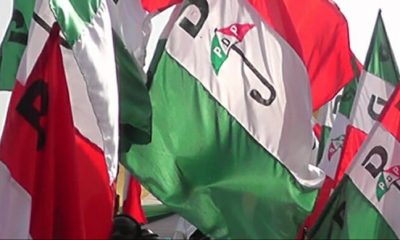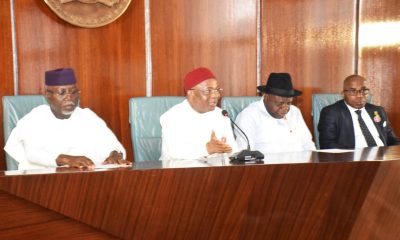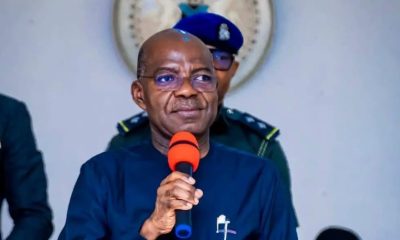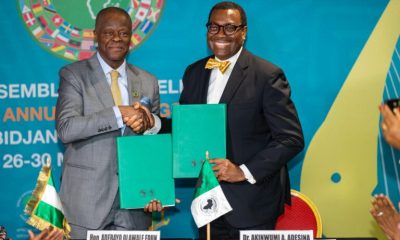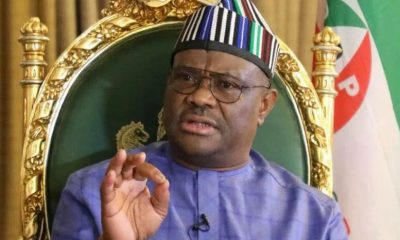Economy
NEC Suspends Subsidy Removal Till After Handover
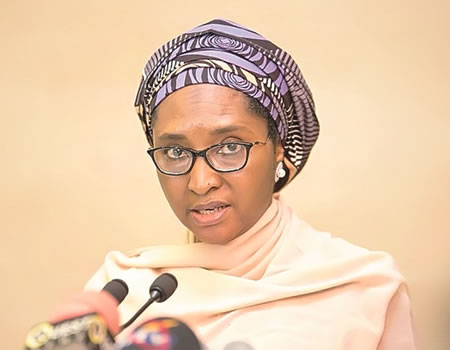
By Mathew Dadiya, Abuja
The National Economic Council (NEC) has suspended the planned removal of petroleum subsidy earlier announced by President Muhammadu Buhari’s administration.
Briefing State House Correspondents after the NEC meeting presided over by Vice President Yemi Osinbajo, the Minister of Finance, Budget and National Planning, Mrs.
Zainab Ahmed disclosed this on Thursday at the Presidential Villa Abuja.Mrs. Ahmed said that the removal of the subsidy will likely take effect in June because the Petroleum Industry Act (PIA), and the 2023 budget provided subsidy till June, adding that any delay may require the amendment of the PIA and the budget provision.
She explained that although the removal of the fuel subsidy is imminent, the Council decided that the timing for the removal of the subsidy should not be now.
The Minister narrated that the council decided that the Federal Government should continue with all of the preparatory work that needs to be done and that this preparation work has to be done in consultation with the states and other key stakeholders, including representatives of the incoming administration.
“The National Economic Council discussed the issue of post-subsidy removal. The Council agreed that the timing for the removal of subsidy should not be now but that we should continue with all of the preparation works that needs to be done and that this preparation work has to be done in consultation with the states and other key stakeholders, including representatives of the incoming administration.
“The council agreed that the fuel subsidy must be removed earlier rather than later because it is not sustainable. We cannot afford it anymore. We have to do it in such a way that the impact of the subsidy is as much as possible, mitigated on the lives of ordinary humans.
“So, this will require looking at alternatives to the post-subsidy that needs to be planned for and subsequently put in place but also what needs to be done to support the people that are most affected as a result of the removal.
“So, we will be working together with representatives of the state who will have a plan that will start working on putting the building blocks towards the eventual removal of the first subsidy. And finally, remind the forum that the budget for 2023 has a provision for subsidy only up to June 2023, and also the petroleum industry Act has a provision that requires that all petroleum products must be deregulated 18 months after the effective date of the PMs removal and that that period is also up to June 2020.
“I said that we agreed to form an expanded committee that will be looking at the process for the removal including determining the exact time and also the measures that need to be taken to provide support to the poor and the vulnerable and then also the alternatives that will be put in place, including ensuring that there is sufficient supply of petroleum products in the country,” the finance, budget and national planning minister, explained.
She further stressed that the issues bordering on the deadline for the removal of fuel subsidy should be the burden of the next administration as the laws state that the removal of fuel subsidy should happen in June.
“What I said is that it is not going to be removed now. Which means it will not be removed before the transition is completed. That’s what it means. But then we have two laws that have inadvertently made the provision that we should exit by June.
“So the committee’s work, which will include the representatives of the incoming administration determining if the removal can be done by June then they will plan. The work plan will be designed to exit as of June, but if the determination is that the period is to be extended, it will mean that we as a country will have to revisit the Appropriation Act for example because the 2023 budget only made provision up to June.
“So, if we’re extending beyond June it means we’ll have to revisit the Appropriation Act and do a supplementary or amend the bill and also the Petroleum Industry Act (PIA).
“So, these are the reasons why we had to do this consultation. We would like to get input from the governors. They’re going to provide us with their representatives to work together with us to have a defined process that will take us toward the removal.
“But one thing that is clear is everybody agrees that the subsidy should be removed very quickly because the cost is only not efficient but is also not sustainable, and that when the time comes for removal, the removal will be done once and for all,” she said
Fielding questions on the specific measures to be put in place to mitigate the effect of subsidy removal and how the decision will affect the law on the ground as the PIA has given a definite time for the removal of subsidy, the 2023 budget provides for subsidy until June 2023, what happens after June 2023, she said:
“I said that we agreed to form an expanded committee that will be looking at the process for the removal including determining the exact time and also the measures that need to be taken to provide support to the poor and the vulnerable and then also the alternatives that will be put in place, including ensuring that there is sufficient supply of petroleum products in the country.
“So this is a decision that has been taken to expand the committee that is currently working with representatives of the states and it also will have to be engaging with labour, will have to be engaging with petroleum marketers.
“The immediate committee is just comprising the Ministry of Finance, the NNPC, the downstream upstream regulator, as well as the Ministry of Finance, budget, a national plan. So there’ll be an expanded committee so that it is not just a few people’s thoughts that will guide the process but that there is sufficient consultation taking inputs from key stakeholders into the measures that need to be taken.”
Responding to a question on the $800m World Bank loan to help cushion the effect of fuel subsidy removal, the Minister said, “On the issue of the $800 million so far, what we have is that $800 million that has been secured.
“We’re hoping that the removal of fuel subsidy, with the savings that removal will cause that the Federation which is the federal government and states themselves will be able to provide further measures from this increased revenue that will accrue to the Federation account.
“Again, that is a matter of discussion. The states may want to have their design programmes the federal government you want to do something different. So we have to discuss how to utilise that savings and that’s one thing that was also presented today at the National Economic Council.”
Economy
We’ll Continue Borrowing Within Sustainable Limits- FG

The Federal Government says it will continue to borrow within manageable and sustainable limits in accordance with the Debt Management Office (DMO) debt sustainability framework.
This is contained in a statement by the Director, Information and Public Relations in the Ministry of Finance, Mr Mohammed Manga, in Abuja on Wednesday.
President Bola Tinubu recently requested the approval of the 2024 – 2026 external borrowing rolling plan from the National Assembly.
Tinubu has requested the National Assembly’s approval to secure external loans of 21.5 million dollars and 15 billion Yuan, along with a grant of 65 million Euro, as part of the federal government’s proposed 2025–2026 external borrowing plan.
Manga said that the proposed borrowing plan was an essential component of the Medium-Term Expenditure Framework (MTEF) in accordance with both the Fiscal Responsibility Act 2007 and the DMO Act 2003.
“The plan outlines the external borrowing framework for both the federal and sub-national governments over a three-year period, accompanied by five detailed appendices on the projects, terms and conditions, implementation period, etc.
“By adopting a structured, forward-looking approach, the plan facilitates comprehensive financial planning and avoids the inefficiencies of ad-hoc or reactive borrowing practices.
“This strategic method enhances the country’s ability to implement effective fiscal policies and mobilise development resources,” he said.
According to the statement, the borrowing plan does not equate to actual borrowing for the period.
“The actual borrowing for each year is contained in the annual budget. In 2025, the external borrowing component is 1.23 billion dollars, and it has not yet been drawn.
“This is planned for H2 2025, the plan is for both federal and several state governments across numerous geopolitical zones including Abia, Bauchi, Borno, Gombe, Kaduna, Lagos, Niger, Oyo, Sokoto, and Yobe States.
“Importantly, it should be noted that the borrowing rolling plan does not equate to an automatic increase in the nation’s debt burden.
“The nature of the rolling plan means that borrowings are split over the period of the projects, for example, a large proportion of projects in the 2024–2026 rolling plan have multi-year drawdowns of between five to seven years which are project-tied loans,” Manga said.
He said that these projects cut across critical sectors of the economy, including power grids and transmission lines, irrigation for improving food security, fibre optics network across the country, fighter jets for security, rail and road infrastructure.
According to him, the majority of the proposed borrowing will be sourced from the country’s development partners, like the World Bank, African Development Bank, French Development Agency, European Investment Bank, JICA, China EximBank, and the Islamic Development Bank.
Manga said that these institutions offer concessional financing with favourable terms and long repayment periods, thereby supporting Nigeria’s development objectives sustainably.
He said that the government seeks to reiterate that the debt service to revenue ratio has started decreasing from its peak of over 90 per cent in 2023.
Manga said that the government has ended the distortionary and inflationary ways and means.
According to him, there is significant revenue expectations from the Nigerian National Petroleum Corporation Limited (NNPC Ltd), technology-enabled monitoring and collection of surpluses from government owned enterprises and revenue-generating ministries, departments, and agencies and legacy outstanding dues.
“Having achieved a fair degree of macroeconomic stabilisation, the overarching goal of the federal government is to pivot the economy onto a path of rapid, sustained, and inclusive economic growth.
“Achieving this vision requires substantial investment in critical sectors such as transportation, energy, infrastructure, and agriculture.
“These investments will lay the groundwork for long-term economic diversification and encourage private sector participation.
“Our debt strategy is therefore guided not solely by the size of our obligations, but by the utility, sustainability, and economic returns of the borrowing,” he said.(NAN)
The Federal Government says it will continue to borrow within manageable and sustainable limits in accordance with the Debt Management Office (DMO) debt sustainability framework.
This is contained in a statement by the Director, Information and Public Relations in the Ministry of Finance, Mr Mohammed Manga, in Abuja on Wednesday.
President Bola Tinubu recently requested the approval of the 2024 – 2026 external borrowing rolling plan from the National Assembly.
Tinubu has requested the National Assembly’s approval to secure external loans of 21.5 million dollars and 15 billion Yuan, along with a grant of 65 million Euro, as part of the federal government’s proposed 2025–2026 external borrowing plan.
Manga said that the proposed borrowing plan was an essential component of the Medium-Term Expenditure Framework (MTEF) in accordance with both the Fiscal Responsibility Act 2007 and the DMO Act 2003.
“The plan outlines the external borrowing framework for both the federal and sub-national governments over a three-year period, accompanied by five detailed appendices on the projects, terms and conditions, implementation period, etc.
“By adopting a structured, forward-looking approach, the plan facilitates comprehensive financial planning and avoids the inefficiencies of ad-hoc or reactive borrowing practices.
“This strategic method enhances the country’s ability to implement effective fiscal policies and mobilise development resources,” he said.
According to the statement, the borrowing plan does not equate to actual borrowing for the period.
“The actual borrowing for each year is contained in the annual budget. In 2025, the external borrowing component is 1.23 billion dollars, and it has not yet been drawn.
“This is planned for H2 2025, the plan is for both federal and several state governments across numerous geopolitical zones including Abia, Bauchi, Borno, Gombe, Kaduna, Lagos, Niger, Oyo, Sokoto, and Yobe States.
“Importantly, it should be noted that the borrowing rolling plan does not equate to an automatic increase in the nation’s debt burden.
“The nature of the rolling plan means that borrowings are split over the period of the projects, for example, a large proportion of projects in the 2024–2026 rolling plan have multi-year drawdowns of between five to seven years which are project-tied loans,” Manga said.
He said that these projects cut across critical sectors of the economy, including power grids and transmission lines, irrigation for improving food security, fibre optics network across the country, fighter jets for security, rail and road infrastructure.
According to him, the majority of the proposed borrowing will be sourced from the country’s development partners, like the World Bank, African Development Bank, French Development Agency, European Investment Bank, JICA, China EximBank, and the Islamic Development Bank.
Manga said that these institutions offer concessional financing with favourable terms and long repayment periods, thereby supporting Nigeria’s development objectives sustainably.
He said that the government seeks to reiterate that the debt service to revenue ratio has started decreasing from its peak of over 90 per cent in 2023.
Manga said that the government has ended the distortionary and inflationary ways and means.
According to him, there is significant revenue expectations from the Nigerian National Petroleum Corporation Limited (NNPC Ltd), technology-enabled monitoring and collection of surpluses from government owned enterprises and revenue-generating ministries, departments, and agencies and legacy outstanding dues.
“Having achieved a fair degree of macroeconomic stabilisation, the overarching goal of the federal government is to pivot the economy onto a path of rapid, sustained, and inclusive economic growth.
“Achieving this vision requires substantial investment in critical sectors such as transportation, energy, infrastructure, and agriculture.
“These investments will lay the groundwork for long-term economic diversification and encourage private sector participation.
“Our debt strategy is therefore guided not solely by the size of our obligations, but by the utility, sustainability, and economic returns of the borrowing,” he said.(NAN)
Economy
Organise Informal Sector, Tax Prosperity Not Poverty, Adedeji Tasks Officials

The Chairman, Joint Tax Board (JTB), Dr Zacch Adedeji, has urged officials of the board to organise traders and artisans into a formal body before capturing them in the tax net.
Adedeji said that this was in line with the agenda of President Bola Tinubu not to tax poverty but prosperity.
The chairman stated this at the 157th Joint Tax Board meeting held in Ibadan, on Monday.
The theme of the meeting “Taxation of the Informal Sector: Potentials and Challenges”.
Speaking on the theme of the event, Adedeji stressed the need to evolve a system that would make the informal sector formal before it could be taxed.
Adedeji, who also doubles as the Chairman, Federal Inland Revenue Service, (FIRS), said “What I would not expect from the JTB meeting is to define a system that would tax the informal sector.
“The only thing is to formalize the informal sector, not to design a system on how to collect tax from market men and women.
“As revenue administrator, our goal is to organise the informal sector so that it can fit into existing tax law.”
Citing a report of the National Bureau of Statistics (NBS) in the first quarter of 2023, the chairman said that the nation’s unemployment index was attributable to recognised informal work.
Adedeji stated that workers in that sector accounted for 92.6 per cent of the employed population in the country as at Q1 2023.
“JTB IS transiting to the Joint Revenue Board with expanded scope and functions.
“We are hopeful that by the time we hold the next meeting of the Board, the Joint Revenue Board (Establishment) Bill would have been signed into Law by the President.
“The meetings of the board provide the platform for members to engage and brainstorm on contemporary and emerging issues on tax, and taxation,” he said.
In his address, Gov. Seyi Makinde of Oyo State, said the theme of the meeting was apt and timely, stressing that it coincides with the agenda of the state to improve on its internally generated revenue.
According to him, the meeting should find the best way forward in addressing the issue of the informal sector and balance the identified challenges.
“Nigeria is rich in natural resources, but it is a poor country because economic prosperity does not base on natural resources,”
Makinde also said that knowledge, skill and intensive production were required for economic prosperity, not just the availability of natural resources.
He stressed the need to move from expecting Federal Allocations to generating income internally.
“We are actively ensuring that people are productive and moving the revenue base forward,” Makinde said.
The governor said that tax drive should be done by simplifying tax processes, incentives for compliance like access to empowerment schemes and loans.
He urged JTB to deepen partnership and innovation in using data on tax to track and administer it.
Earlier, the Executive Chairman, Oyo State Board of Internal Revenue, Mr Olufemi Awakan, said the meeting was to address tax-related matters, evolve a workable, effective and
efficient tax system across the states and at the Federal level.
He urged participants to find amicable solutions to challenges of tax jurisdiction, among others.
Tax administrators from all the 36 states of the federation, who are members of JTB, were in attendance. (NAN)
Economy
Customs Zone D Seizes Contraband Worth N110m

The Nigeria Customs Service (NCS), Federal Operation Unit (FOU), Zone D, has seized smuggled goods worth over N110 million between April 20 till date.
The Comptroller of Customs, Abubakar Umar, said this at a news conference on Tuesday in Bauchi.
He listed the seized items to include 11,200 litres of petrol; 192 bales of second hand clothing, 140 cartons of pasta, 125 pairs of jungle boots, 47 bags of foreign parboiled rice and 9.
40 kilogramme of pangolin scales.Umar said the items were seized through increased patrols, intelligence-led operations, and strengthened inter-agency collaboration.
The comptroller said the pangolin scales would be handed over to the National Environmental Standards and Regulations Enforcement Agency (NESREA) for appropriate action, while the seized petrol would be auctioned, and the proceeds remitted to the federation account.
He attributed the decrease in smuggling activities of wildlife, narcotics, and fuel to the dedication and professionalism displayed by the personnel in line with Sections 226 and 245 of the NCS Act 2023.
The comptroller enjoined traders to remain law abiding, adding the service would scale up sensitisation activities to combat smuggling.
“We remain resolute in securing the borders and contributing to Nigeria’s economic development,” he said.
The FOU Zone D comprises Adamawa; Taraba, Bauchi, Gombe, Borno, Yobe, Plateau, Benue and Nasarawa. (NAN)

